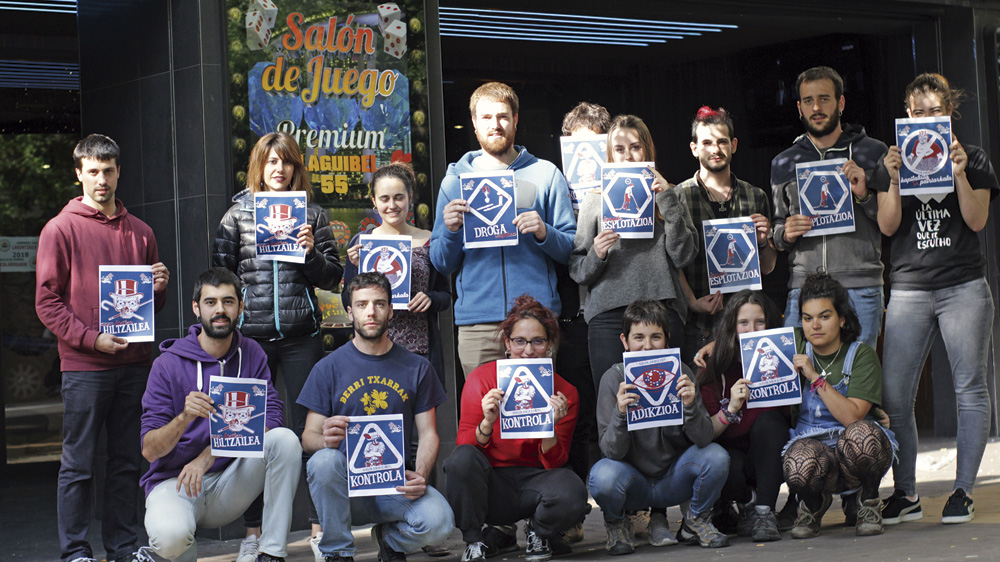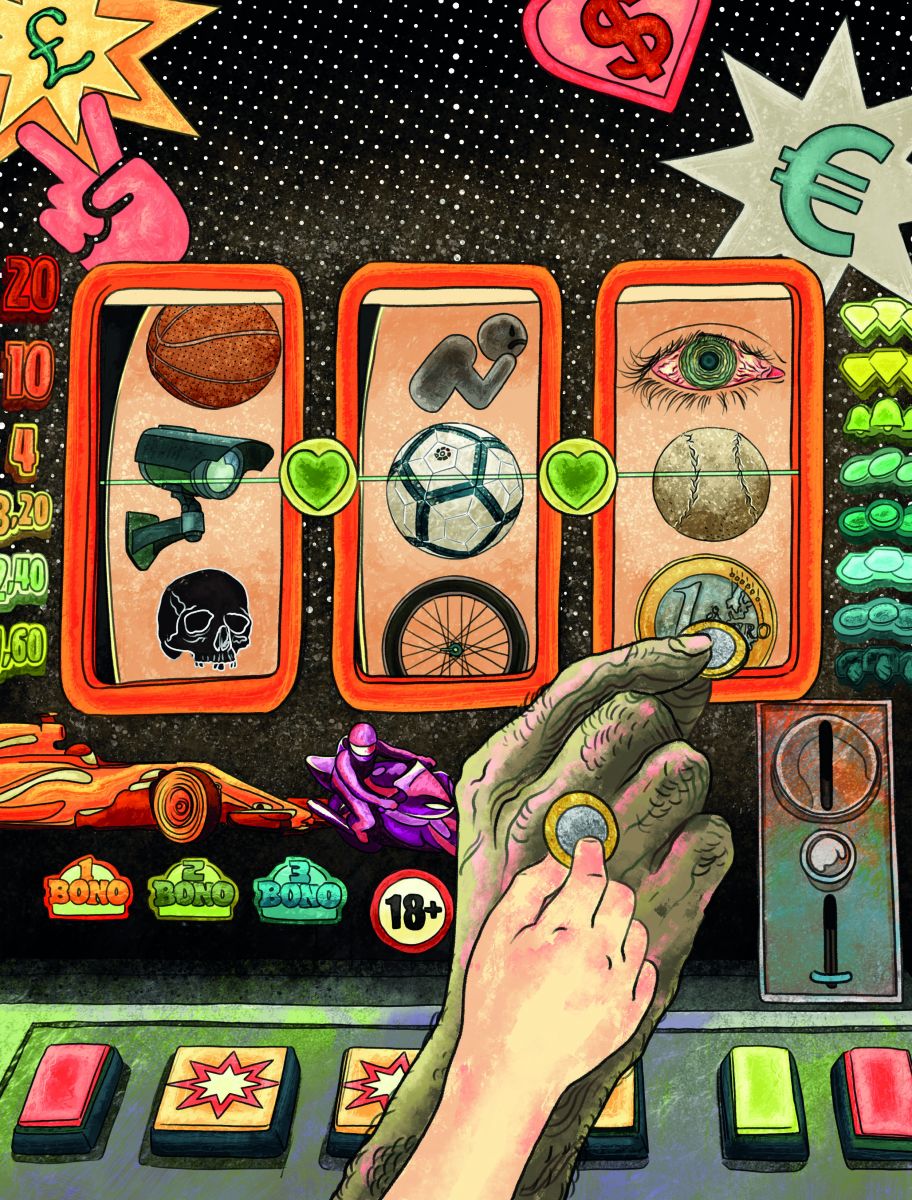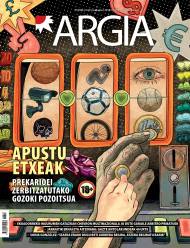Normalize the game, a risky wager
- Many shops and accommodations in our villages have closed their doors and new playrooms are being opened, mainly in the shadow of sports betting. We are increasingly young in the game, attracted to a great extent by the comfort and spontaneity offered by the Internet, the mobile phone. However, what appears to be an advantage is often detrimental, according to associations fighting addiction. The increasingly normalized image of the game, as it is to the detriment, as we have been warned by the Assembly of Young People of Judimendi of Vitoria-Gasteiz and the Elkar-ekin group of Azpeitia.

According to data provided by Gasteiz Today in May, there were 27 gambling halls in the capital of Alavesa and five others were about to open. Thus, by the end of the year, the 32nd edition. Most of them are premises where play and bar-restaurant machines are combined, clean and bright, which do not look like those dark rooms that you can see in the movies. Sometimes, the ground sets the boundary between two worlds: wood-bar, and sleek carpet in the slot machine area.
Precisely, the symbiosis of these two worlds that converge in the same space is one of the main concerns of organizations fighting for gambling, as it means to normalize the image of gambling halls, that is, to normalize the game, especially among the increasingly younger clients, attracted to a large extent by sports betting. Within this standardisation process, it is essential to mention, for example, betting houses that sponsor events and sports groups, as well as advertisements that are inserted both in television broadcasts and in the pages of specialized newspapers.
The games room opened last year in the Vitorian district of Judimensiondi, and it was then that the Gazte Asanblada began working on the subject. Last June, the out-of-play result in the neighborhood has been announced in several detail reports of the gambling hall. In it, among other things, they have denounced the “individualistic consumption model” hidden under the shadow of the colorful lights, which mainly affects the client of a certain profile: men with low incomes, highlighting “the great number of young people and immigrants”.
Normal bars?
“The normalization of the game is what concerns us most and its relationship with gambling pathology,” explained the members of the Youth Assembly of Judimensiondi, Karla Agirre Aranburu and Aitor Brazal Cabra: “They look like normal bars. In one place they have machines, but in the rest… Many customers are going to have breakfast or prune there. Entering the gambling hall doesn’t mean you go to play, it doesn’t have a negative connotation.”
The young people have denounced that the head of the machines, the chain that owns more rooms in the city, pays the rent of all the premises, but that the bar is run by another company: “Because it does not pay rent, it has the possibility of lowering the price of pintxos and drinks, and the rest of the bars in the neighborhood cannot compete with it. In a short time two bars have been closed here because to a large extent they have lost customers who were going to have breakfast, as we have been told by the hotel owners themselves.” According to the Assembly’s survey, many people believe that the gambling hall “kills neighborhood life.”

Another of the main conclusions is the increase in social control. The gambling halls have cameras both inside and in the lobby “to control customers and workers”. In addition, the young people say that there have been incidents in the vicinity of the premises and that the drug traffickers "have been working with complete peace of mind", despite the fact that "with this excuse" the police presence has increased in the neighborhood.
The members of the Gazte Asanblada de Judimendi have carried out an observation work inside the room and some people who have worked in it have explained that two types of clients can be distinguished: those who come to drink something at the bar, in some cases approaching the machines, and those who will act directly. Most of them are men, with low money sources and appear one-on-one. Asked about the gender of clients and players, young people have told us that culturally bars have not been the space of women, and adding “the prospect of spending money”, it is better to understand the greater presence of men. “We have not had money in our hands, for what and to play,” Agirre told us. “There is another component,” Brazal continues, focusing on the theme of sports betting: “Playing money is closely related to competitiveness, to see who knows more, more related to the role of men.” In this sense, the professor of sociology at the Carlos III University of Madrid, José Antonio Gómez, stated in the newspaper El País that the wager is “like poker”: “People will not only earn money, but to teach what they know about football, basketball or any other sport”.
Up and up non-stop
Judimendi, Zaramaga, coming soon in Txagorritxu… Many of the gambling halls of Vitoria-Gasteiz are in the working-class neighborhoods, on the periphery. “That shows what your client goal is,” they say from the youth assembly. “It’s no coincidence, following the false dream of a better future, because the addiction it generates is oriented to the one who has less of it to play it.”
In the same vein, we have heard from Eneko Ibarguren, a member of the Elkar group of Azpeitia (Gipuzkoa), about the betting room that will open in the village and the concentration called against it in July: “Companies in the sector are making great fortunes in working-class neighborhoods, because people often bet on meeting their economic needs.”
It has provided us with a data related to sports betting to locate the theme: Ten years have passed since the company Reta, owner of the Azpeitia room, opened its first place in Bilbao. Since then, the Spanish State has about 50 open shops and over 2,500 betting terminals in hundreds of bars. “Since the economic crisis, the betting market has grown significantly,” says Ibarguren.
According to the data provided by the Basque Government, in 2017 € 340 million were played in physical betting terminals and web pages of companies based in Álava, Bizkaia and Gipuzkoa (Reta, Kirol and Garaipen/Codere), 10% more than in 2016 and 113% more than in 2012. In Navarre, the rise is similar: Last year there were 74 million euros, 10.92% more than in 2016, and 150% more than in 2012. Companies in the sector, for their part, made profits of 58 million euros, 13% more than in 2016 and 80% more than in 2012. This represents about 15% of the wagers, which represents a lower profit margin than that of Lotteries and Bets of the State, which in this case is 40%.
To these figures must be added the figures for companies operating beyond our borders, often from tax havens. In fact, when you talk about online betting, you cannot give an exact amount of money; we are talking about billions of euros.
With regard to all this, it should be stressed that today there is not much more money to be played than before the crisis, but that the type of game has changed: casinos, bingo, quiniela... and, in addition, the sports betting we are talking about have risen.
Working-class neighbourhoods at the starting point
“Associations against Pathology have often called for the opening of similar premises to be regulated, but…” Ibarguren continued. In larger cities like Madrid or London, the connection of slums with gambling halls was the origin of the debate that emerged a long time ago. These are not the only examples. On the other hand, it is inevitable to cite Gamonal, neighborhood of Burgos (Spanish state), as a model of struggle for the agents of Azpeitia or Vitoria. They have been working for years to promote the debate on the growth of the game in working-class neighborhoods and the damage it generates, and they have produced a wide range of demands. Among other measures, a group of citizens has asked the City Hall not to grant licences to companies in the gambling sector to remove their advertising of events and sports spaces, and not to use the media to promote betting and gambling. Gamonal people will soon be in Judimensiondi to participate in a lecture cycle on the game. Round tables will also be held in Azpeitia in October (17 October). What is behind betting houses? Journalist Igor Meltxor will answer the question, and on the 23rd, Julen and Maider Santamaría, from the Virtuss Adicciones association, will analyze the issue of betting houses and gambling dens. Both conferences will take place in Sanagustin at 19:00 and have also started a collection of signatures against the new games room in the capital of Navarra. The interlocutors are aware that the closing of the rooms is not easy, but they say that they will try to do so, coinciding with the socialization of the debate, making “direct pressure”, as explained by the young people of Judimendi, remembering the protest actions they have carried out inside the gambling hall.
Sports betting: encouragement for clubs, burden for many
Vitoria-Gasteiz and Azpeitia have been the protagonists of the day, but the game is a much wider phenomenon than the current one. If we see a site in our villages, it is possible that a new room will be opened, to which it should be added that almost all of us carry a potential slot machine in our pockets, camouflaged on mobile phones, with the consequences that this entails, which is easier to play and more difficult to control, according to the associations that work to prevent pathological gambling.
In addition, more and more sports teams place the logo of the betting houses on the panels of their stadiums and on the players’ t-shirts, which will be bought by amateurs, including minors. The fever has especially caught the football clubs, but not only them (“The Bilbao Basket has signed a 10-year agreement with RetaBet, which wants to be an incentive and a source of confidence for the club”, we have just read in El Correo, to quote one example). And it is becoming more and more normal that in sports broadcasts the media interspersed ads that invite us to wager, such as on EITB’s television and radio channels.
We will focus on football on the following lines, especially on data from Britain, where the debate on betting houses is very present, as demonstrated by the political leap. The situation there should give us some thought.
Of the teams that play the two main English categories, 60% take the logo of betting houses or virtual casinos on t-shirts, as the main sponsor, and more have as secondary sponsors. In the Spanish state, among the first division teams, the Real Sociedad (at the moment) is the only one that does not have a sponsor, although in previous seasons it accompanied Kirolbet.

During the Football World Cup held in Russia, the advertisements of gambling companies reached almost twice as much television space as those of alcoholic beverages and four times as much as those of faster meals. The Vice-President of the Labour Party, Tom Watson, spoke on the BBC television: “One of the blackest aspects of this brilliant World Cup has been the bombardment of announcements about the game, both on television and on social networks. Thousands of children have seen them.”
According to the survey conducted by this country’s Gambling Commission in 2017, 12% of young people between 11 and 16 make a wager a week, approximately 370,000 people, of whom 25,000 are “ups gamollers”, people with gambling problems.
We opened a parentheses. The Alaveses Players Association in Rehabilitation ASAJER treated 146 people in 2017, two of them minors, even though it is prohibited to play under 18 years of age. In the words of the aforementioned sociologist, José Antonio Gómez, “game is a more leisure option, such as buying a book or going to the cinema or theatre. In his opinion, “the question is that Spanish society is very moralist”. In order to locate it, he has prepared the report Anuario del Juego, edited jointly by the Universidad Carlos III and the company of the game sector Codere. On the contrary, Manu Egaña, of the company Kirol Bet, said in an interview published in August that it cannot fall into “banalization”: “It is not a form of leisure anymore. It’s like Txikiteo, it can be healthy, but if you do it every day, tomorrow and later, the doctor will tell you that you have a problem.”
According to the 2017 survey conducted by the British association Gamble Aware, 35% of young people aged 15-24 acknowledged having been driven by a TV spot. In fact, the connection between the visualization of these ads in the media and the problems of addiction is not proven, but experts believe that more work needs to be done in this regard. The Gambling Watch observatory has warned that “it is clear that the game is becoming more and more normal, especially among the youngest. More and more wagers are taken as elements to follow sports events or to protect the favorite group.”
Game “responsible”, yes, but...
Former professional footballer Joey Barton, condemned to wager between 2006 and 2016 a total of 1,260 illegal football (players cannot wager), said that football leaders must assume that there is a "conflict of interests". “There is a great collision between its rules and the culture surrounding the modern game.” This concern has led the English Federation (FA) to suspend the ad deal with Ladbrokes Coral in 2017. It is now up to the groups to link sponsorships. If you partner with a playhouse, the youth teams can't show your logo.
At the other end of the string, the EFL League Cup Championship has signed a five-year agreement with Sky Bet. Both sides have explained that they will work “for a responsible game”, as demonstrated by the motto that football players wear on T-shirts: “When the fun is interrupted, stop.” In the same line as Manu Egaña, of the company Kirol Bet: “It is up to us to build a responsible game model; companies and associations [around gambling pathology] have to work together, as well as universities, governments and the Administration in general.” Asked if there is a basis for this, he says that the debate should be moved to the parameters of Euskal Herria: “In Madrid the liberalisation is total and the gambling halls are opening at a distance of 100 meters; here everything is much more regulated, we have other problems, we do not import those of Madrid”.

Responsible play. This term is Bogan. It is used by companies in the sector, administrations, associations of pathological gambling... But it cannot be said that they agree on their way of understanding. “Associations deserve a monument, but if we leave all the responsibility, we have to provide them with resources,” says Egaña. “In Aragon, 1% of the tax collected goes to prevention work. It's not much, but there's at least something. Moreover, the progressive implementation of gambling in Osakidetza and in social services. We have to see responsible play as a common challenge [for the whole of the Basque Country].”
In the words of the Elkar collective, while betting houses are driving the “responsible game”, “addictive techniques” are being used such as welcome bonuses, free consumptions while producing live broadcasts or ticket draws to watch live sports events.
In Italy, the road to a ban
Concerned about the rise of sports betting, from January 2019 the Italian Government will prohibit the advertising of betting houses and the sponsorship of betting houses to sports teams, except in the case of clubs with an advertising agreement signed beyond that date. “The gaming industry has become too big at the expense of the health and dignity of citizens,” said House Vice-President Luigi di Maio at a press conference. He said that wagering is 'plunging families', which affects public health and public health budgets. According to the latest data, in 2017 400,000 Italians had "problems" with wagering, four times more than ten years ago.
Some of the most critical of the decree are football teams. League A has announced that the Italian club will put them at a disadvantage compared to the rest of Europe that they will continue to sign sponsorship agreements with betting houses. On the other hand, gambling associations and companies have warned of the consequences of the ban – employers have used the term “risk” – as people can push “clandestine” spaces.
What's going to happen in the Basque Country, who knows? We often hear that ours is a people that “carries the wager in the veins”, which has been played “always”. But that doesn't mean there's never been a problem. “In the past, the dwellings were lost,” the young people of Judimensiondi told us. “One difference is that maybe you used to wager on the fronton, but now you have playrooms, internet... we have everything closer, everything is easier, more normal. That is what we want to underline.”
Indarrean sartu da Eusko Jaurlaritzak eginiko jokoaren lege berria EAEn. Aurrerantzean, apustu etxeek ikastetxeetatik gutxienez 150 metrora egon beharko dute, eta bi joko aretoren artean 500 metroko distantzia errespetatu beharko dute.






















